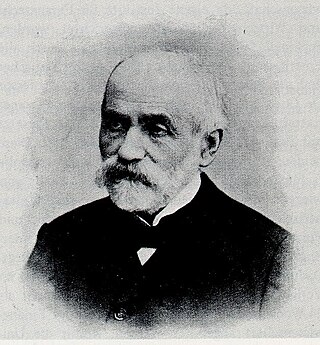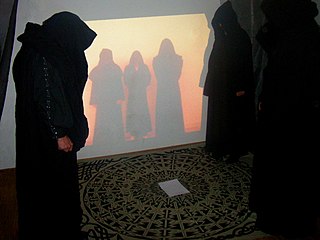Primitive Culture may refer to:
- Urgesellschaft, a term for human culture prior to recorded history
- Primitive Culture (book), by Edward Burnett Tylor
Primitive Culture may refer to:
Animism is the belief that objects, places, and creatures all possess a distinct spiritual essence. Animism perceives all things—animals, plants, rocks, rivers, weather systems, human handiwork, and in some cases words—as being animated, having agency and free will. Animism is used in anthropology of religion as a term for the belief system of many Indigenous peoples in contrast to the relatively more recent development of organized religions. Animism is a metaphysical belief which focuses on the supernatural universe : specifically, on the concept of the immaterial soul.

Ethnocentrism in social science and anthropology—as well as in colloquial English discourse—means to apply one's own culture or ethnicity as a frame of reference to judge other cultures, practices, behaviors, beliefs, and people, instead of using the standards of the particular culture involved. Since this judgment is often negative, some people also use the term to refer to the belief that one's culture is superior to, or more correct or normal than, all others—especially regarding the distinctions that define each ethnicity's cultural identity, such as language, behavior, customs, and religion. In common usage, it can also simply mean any culturally biased judgment. For example, ethnocentrism can be seen in the common portrayals of the Global South and the Global North.
Primitive may refer to:
Gaelic is an adjective that means "pertaining to the Gaels". It may refer to:

Sir Edward Burnett Tylor was an English anthropologist, and professor of anthropology.
Primitive Baptists – also known as Regular Baptists, Old School Baptists, Foot Washing Baptists, or, derisively, Hard Shell Baptists – are conservative Baptists adhering to a degree of Calvinist beliefs who coalesced out of the controversy among Baptists in the early 19th century over the appropriateness of mission boards, tract societies, and temperance societies. Primitive Baptists are a subset of the Calvinistic Baptist tradition. The adjective "primitive" in the name is used in the sense of "original".
In computer science, boxing is the transformation of placing a primitive type within an object so that the value can be used as a reference. Unboxing is the reverse transformation of extracting the primitive value from its wrapper object. Autoboxing is the term for automatically applying boxing and/or unboxing transformations as needed.

Modern primitives or urban primitives are people in developed, or modern nations who engage in body modification rituals and practices inspired by the ceremonies, rites of passage, or bodily ornamentation in what they consider traditional cultures. These practices may include body piercing, tattooing, play piercing, flesh hook suspension, corset training, scarification, branding, and cutting. The stated motivation for engaging in these varied practices may be personal growth, personal rites of passage, rejection of society, as a way to connect with antiquity, or spiritual and sexual curiosity.

Technopaganism is the merging of neopaganism and magical ritual with digital technologies. This may be through the use of technology merely as an aid, such as video conferencing for example, or it may be a worship of the technology itself. The internet for instance, may be seen by some as having spiritual significance. Techno-music may also be involved in technopaganism. Modern tribal and urban primitive movements such as cyberpunk, urban shamanism and rave culture are associated with electronic dance music.
Barbarism, barbarity, or barbarous may refer to:
Primitive Culture is an 1871 book by Edward Burnett Tylor. In his book, Tylor debates the relationship between "primitive" societies, and "civilized" societies, a key theme in 19th century anthropological literature.
Primitive man may refer to:
Prehistoric man may refer to:
Romance literature may refer to:

Sociological, psychological, and anthropological theories about religion generally attempt to explain the origin and function of religion. These theories define what they present as universal characteristics of religious belief and practice.

Small talk is an informal type of discourse that does not cover any functional topics of conversation or any transactions that need to be addressed. In essence, it is polite and standard conversation about unimportant things.
Confucius was a Chinese thinker and social philosopher.
John Plant may refer to:
Ayn Rand's Objectivism rejects an array of ideas and modes of living that it deems are primitive by nature and indicative of a primitive culture. Objectivism views primitive states of existence as being "savage" and mired in mysticism, fatalism, ignorance, superstition, poverty, passivity, and collectivism. The cure to such a society Objectivism holds is Western civilization, capitalism and modernity, which in its view brings with it reason, individualism, science, industrialization, and ultimately wealth.
Primitive communism is a way of describing the gift economies of hunter-gatherers throughout history, where resources and property hunted or gathered are shared with all members of a group in accordance with individual needs. In political sociology and anthropology, it is also a concept, that describes hunter-gatherer societies as traditionally being based on egalitarian social relations and common ownership. A primary inspiration for both Marx and Engels were Lewis H. Morgan's descriptions of "communism in living" as practised by the Haudenosaunee of North America. In Marx's model of socioeconomic structures, societies with primitive communism had no hierarchical social class structures or capital accumulation.